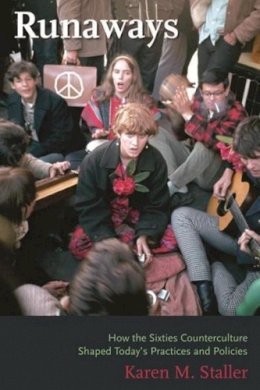
Stock image for illustration purposes only - book cover, edition or condition may vary.
Runaways: How the Sixties Counterculture Shaped Today´s Practices and Policies
Karen Staller
€ 74.08
FREE Delivery in Ireland
Description for Runaways: How the Sixties Counterculture Shaped Today´s Practices and Policies
Hardback. During the 1960s And 1970s, the issue of runaways became a source of national concern. This book examines the programs and policies that took shape during this period. It also discusses the effects of legislation, including the federal Runaway Youth Act of 1974, which endorsed the alternative service community's model. Num Pages: 320 pages, 6 tables. BIC Classification: 1KBB; JKSB1. Category: (P) Professional & Vocational. Dimension: 235 x 162 x 23. Weight in Grams: 568.
During the 1960s and 1970s, runaways became a source of national concern in America. Countercultural activists provided support to runaway youth, and private agencies began developing innovative, sometimes controversial programs to serve them. In this multilayered history, Karen M. Staller examines the programs and policies that took shape during this period and the ways in which the ideas of the alternative-services movement continue to guide our responses to at-risk youth. Staller begins with the 1960s, when the mainstream media began to characterize the act of running away less as an opportunity for exciting adventure (as experienced by Huckleberry Finn) and more as a temptation with dangerous consequences. She then turns to the books, poems, broadsides, and songs produced by Beat writers and countercultural meccas like Haight Ashbury and New York City's East Village, which embraced runaways as kindred social revolutionaries. Adopting the ideology of the Beats, groups like the San Francisco-based Diggers established informal services utilized by runaway adolescents, including crash pads and helplines. Many of their ideas took root, and alternative providers began to bridge the gap between counterculture and mainstream institutions. Staller concludes with an analysis of how the legislative desire to decriminalize running away, coupled with the judicial system's growing discomfort with policing the moral and civic education of youths, led to an increase in the number of troubled children appearing on the streets. It also prompted the enactment of federal runaway youth legislation, including the Runaway Youth Act of 1974, which endorsed the alternative-service community's model. By looking at the history of runaways, Staller illuminates how the mainstream media and countercultural ideologies shaped the identity and perception of this social problem and how developments in service and social policy continue to evolve today.
Product Details
Format
Hardback
Publication date
2006
Publisher
Columbia University Press United States
Number of pages
320
Condition
New
Number of Pages
320
Place of Publication
New York, United States
ISBN
9780231124102
SKU
V9780231124102
Shipping Time
Usually ships in 7 to 11 working days
Ref
99-1
About Karen Staller
Karen M. Staller is assistant professor of social work at the University of Michigan. She has also practiced public interest law with low-income senior citizens and at-risk adolescents in New York City. Karen Staller, PhD, JD is Assistant Professor of Social Work at the University of Michigan, Ann Arbor. Her research focuses on runaway and homeless youth and other at-risk adolescents. Her scholarly interests include the relationship between social problem construction and social policy, interdisciplinary legal-social work practice, and the history of social welfare institutions. She has practiced public interest law with low-income senior citizens and at-risk adolescents in New York City and was educated at Cornell Law School and Columbia University School of Social Work.
Reviews for Runaways: How the Sixties Counterculture Shaped Today´s Practices and Policies
Runaways offers an informative description of the history of service development and media construction of runaway youth in America.
Emilie Smeaton Child and Family Social Work
Emilie Smeaton Child and Family Social Work
